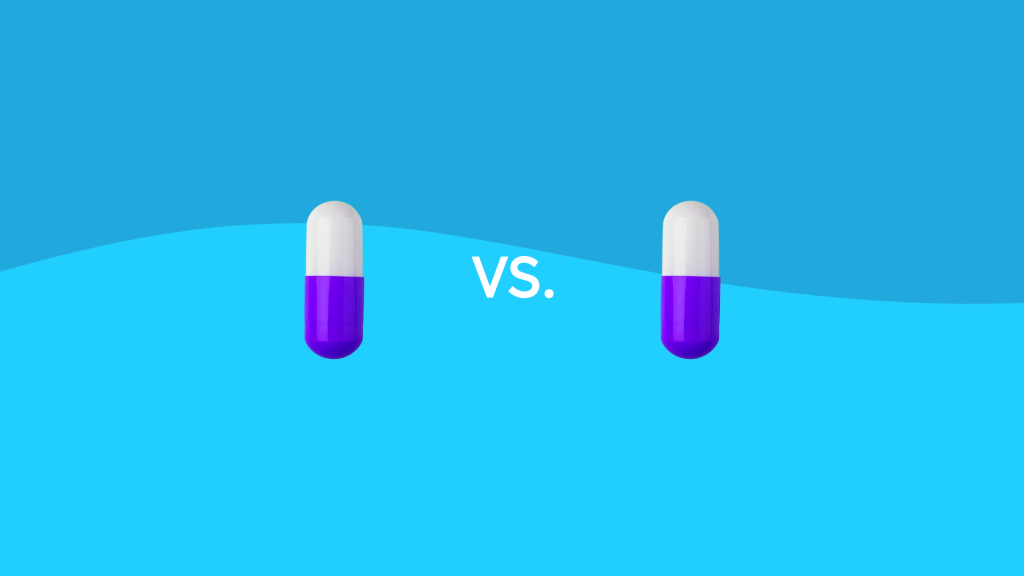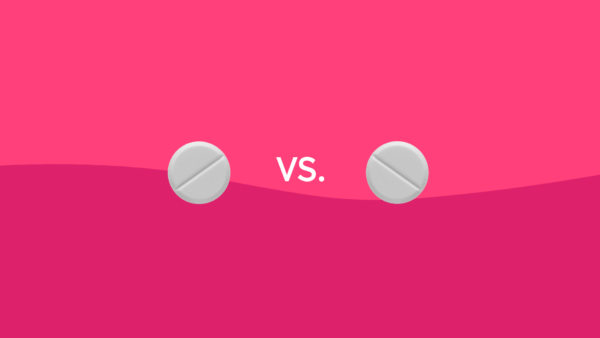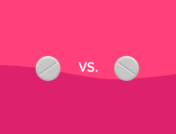Drug overview & main differences | Conditions treated | Efficacy | Insurance coverage and cost comparison | Side effects | Drug interactions | Warnings | FAQ
Doxycycline monohydrate and doxycycline hyclate are two generic prescription antibiotics used to treat various bacterial infections. They are classified into a group of medications called tetracycline antibiotics. Both drugs are approved by the U.S. Food and Drug Administration (FDA). They are known as bacteriostatic drugs—their mechanism of action, or how they work, is by preventing bacteria from growing and spreading.
Both drugs contain the ingredient doxycycline but have a very slightly different chemical makeup in terms of salt forms of the drug. According to the Pfizer prescribing information, doxycycline hyclate is water-soluble, while doxycycline monohydrate is only very slightly water-soluble. Continue reading to learn more about doxycycline monohydrate and doxycycline hyclate.
What are the main differences between doxycycline monohydrate vs. hyclate
Doxycycline monohydrate and doxycycline hyclate both belong to the group of antibiotics called tetracyclines. They work by blocking protein synthesis which prevents the growth of bacteria. Therefore, these antibiotics are considered bacteriostatic. The only difference between doxycycline monohydrate and doxycycline hyclate is in their salt form. We’ll discuss the similarities and differences here. They are both available in brand name and generic, with several brand names for each. Both are available in capsule and tablet form, and doxycycline monohydrate is also available as an oral suspension. The dosage and length of treatment vary by indication. Both forms of doxycycline should not be used in children 8 years of age or younger, because it can cause tooth enamel and growth problems.
| Main differences between doxycycline monohydrate vs. hyclate | ||
|---|---|---|
| Doxycycline monohydrate | Doxycycline hyclate | |
| Drug class | Tetracycline antibiotic | Tetracycline antibiotic |
| Brand/generic status | Brand and generic | Brand and generic |
| What is the brand name? | Adoxa Avidoxy Monodox Oracea Vibramycin oral suspension |
Doryx Acticlate Morgidox Periostat Targadox Vibramycin Vibra-Tabs |
| What form(s) does the drug come in? | Capsules Oral suspension Tablets |
Capsules Tablets |
| What is the standard dosage? | Varies by indication | Varies by indication |
| How long is the typical treatment? | Varies by indication | Varies by indication |
| Who typically uses the medication? | Adults and children 9 years and older | Adults and children 9 years and older |
Conditions treated by doxycycline monohydrate and hyclate
Doxycycline monohydrate or doxycycline hyclate can be used to treat a variety of bacterial infections, such as respiratory tract infections or urinary tract infections caused by certain bacteria. The table below lists examples of the infections that doxycycline (in either form) can treat. Additionally, doxycycline is sometimes used as an alternative drug when the preferred drug, penicillin, cannot be used in certain infections such as gonorrhea, syphilis, or listeriosis. Sometimes, doctors prescribe doxycycline off-label (an indication that is not FDA-approved) for other infections, such as Lyme disease.
| Condition | Doxycycline monohydrate | Doxycycline hyclate |
| Anthrax due to Bacillus anthracis | Yes | Yes |
| Chancroid caused by Haemophilus ducreyi | Yes | Yes |
| Cholera caused by Vibrio cholerae | Yes | Yes |
| Nongonococcal urethritis caused by Ureaplasma urealyticum | Yes | Yes |
| Plague due to Yersinia pestis | Yes | Yes |
| Prevention of malaria | Yes | Yes |
| Q fever | Yes | Yes |
| Respiratory tract infections caused by certain bacteria such as Mycoplasma pneumoniae, Haemophilus influenzae, Klebsiella species, Streptococcus pneumoniae | Yes | Yes |
| Rocky mountain spotted fever | Yes | Yes |
| Severe acne (in combination with other medication) | Yes | Yes |
| Typhus fever | Yes | Yes |
| Uncomplicated urethral, endocervical or rectal infections in adults caused by Chlamydia trachomatis | Yes | Yes |
| Urinary tract infections caused by Klebsiella species | Yes | Yes |
Is doxycycline monohydrate or hyclate more effective?
There are no studies comparing the effectiveness of doxycycline monohydrate and doxycycline hyclate. In most cases, either drug can be used to treat various bacterial infections.
There may be some cases where one formulation is preferred over the other due to the indication. For example, doxycycline hyclate 20 mg is used for periodontitis (gum infection). Another example is doxycycline monohydrate 40 mg, which is used for rosacea inflammatory lesions and should not be interchanged with doxycycline hyclate.
Your healthcare provider can determine the appropriate drug based on your symptoms, culture information (if available), and medical history.
Remember that antibiotics such as doxycycline only treat bacterial infections. They are not effective against viral infections such as the common cold, flu, or COVID-19.
Coverage and cost comparison of doxycycline monohydrate vs. hyclate
Doxycycline monohydrate and doxycycline hyclate are generally covered by insurance and Medicare prescription plans.
A typical prescription of doxycycline monohydrate would cost about $52 if you paid out of pocket but a free SingleCare card can bring the price down to as low as $3.63.
A typical prescription of doxycycline hyclate would cost about $165 if you paid out of pocket but using a free SingleCare card can lower the price to as low as $8.
As prices and plans can change, contact your insurance provider for up-to-date coverage information.
| Doxycycline monohydrate | Doxycycline hyclate | |
| Typically covered by insurance? | Usually | Usually |
| Typically covered by Medicare Part D? | Usually | Usually |
| Quantity | #20, 100 mg capsules | #20, 100 mg capsules |
| Typical Medicare copay | $0-$20 | $0-$5 |
| SingleCare cost | $3+ | $8+ |
Common side effects of doxycycline monohydrate vs. hyclate
The most common side effects of doxycycline (both forms) include:
- Stomach (gastrointestinal) problems: nausea, vomiting, diarrhea, stomach pain. Because doxycycline hyclate is more acidic, it may cause more stomach problems than doxycycline monohydrate, which may be better tolerated, with less stomach problems.
- Vaginal inflammation and yeast infection.
- Headache.
- Sun sensitivity (photosensitivity).
- Skin and tissue hyperpigmentation (dark spots).
- Increased levels of BUN (a measure of kidney function).
- Tooth discoloration (permanent in children 8 years and younger; reversible in adults).
Serious side effects may occur, including:
- Allergic reaction: Symptoms may include hives, difficulty breathing, and swelling around the face, lips, throat, or tongue. These symptoms require emergency medical care.
- Severe skin reaction (Stevens-Johnson syndrome): Symptoms may include fever, burning eyes, sore throat, red or purple rash, and blistering or peeling skin. These symptoms require emergency medical attention.
- Clostridium difficile-associated diarrhea (CDAD): This type of diarrhea can be associated with any antibiotic, including doxycycline. Notify your doctor right away if you have diarrhea, especially if it is watery and/or bloody. Diarrhea can occur during or after treatment, up to several months after treatment ends.
- Sun sensitivity: Avoid excess sunlight and tanning beds while taking doxycycline. This drug can cause a serious skin reaction, making you more likely to get a severe sunburn. When outside, wear protective clothing and apply (and frequently reapply) sunscreen.
- Esophageal irritation and ulceration: While taking doxycycline, drink plenty of fluids and do not lie down for some time after taking the medication. Do not take doxycycline before bed.
- Low white blood cell counts: Call your provider immediately if you have fever, chills, swollen glands, body aches, weakness, pale skin, or if you bruise or bleed easily.
- Increased pressure in the skull: Symptoms may include severe headaches, dizziness, nausea, vision disturbances, pain behind the eyes, or ringing in the ears. Call your doctor right away if symptoms occur.
- Liver or pancreas problems: Be alert for symptoms such as appetite loss, stomach pain, fatigue, nausea, vomiting, or yellowing of the skin or whites of the eyes, and notify your doctor right away.
This is not a full list of side effects. Other adverse effects may occur. Before taking doxycycline monohydrate or doxycycline hyclate, talk to your healthcare professional about what side effects to expect and what to do if they occur.
Source: Epocrates (doxycycline)
Drug interactions of doxycycline monohydrate vs. hyclate
Doxycycline monohydrate and doxycycline hyclate have the same drug interactions.
Doxycycline can interact with certain drugs, including:
- Antacids: Antacids that contain calcium, magnesium, iron, or aluminum can interfere with the absorption and bioavailability of doxycycline, making doxycycline less effective.
- Blood thinners (anticoagulants) such as Coumadin (warfarin): If these drugs are taken together, the blood thinner dose may need to be lowered, to reduce the risk of bleeding.
- Anticonvulsants such as phenobarbital, Tegretol (carbamazepine), or Dilantin (phenytoin) can interfere with the absorption of doxycycline, making doxycycline less effective.
- Doxycycline can make oral contraceptives (hormonal birth control pills) less effective. A backup method of birth control should be used. Talk with your doctor about using effective non-hormonal birth control if needed while taking doxycycline, such as a condom and spermicide.
- Isotretinoin, which is the ingredient found in drugs such as Accutane, Absorica, Sotret, and others. Both isotretinoin and doxycycline can cause intracranial hypertension (see Warnings section) and should not be taken together.
- Penicillin: Doxycycline generally should not be taken with penicillin.
This is not a full list of drug interactions, and others may occur. Before taking doxycycline monohydrate or doxycycline hyclate, tell your doctor about all the medications you take, including prescription and OTC drugs, vitamins, and supplements.
| Drug | Drug Class | Interacts with doxycycline monohydrate | Interacts with doxycycline hyclate |
| Accutane, Absorica, Sotret (isotretinoin) | Retinoids | Yes | Yes |
| Antacids that contain calcium, magnesium, iron, or aluminum | Antacids | Yes | Yes |
| Coumadin (warfarin) | Blood thinner | Yes | Yes |
| Dilantin (phenytoin)
Phenobarbital Tegretol (carbamazepine) |
Anticonvulsants | Yes | Yes |
| Oral contraceptives | Oral contraceptives | Yes | Yes |
| Penicillin | Penicillin antibiotic | Yes | Yes |
Warnings of doxycycline monohydrate and hyclate
- Avoid excess sunlight or artificial UV light (e.g., tanning beds) while taking any form of doxycycline. If a skin reaction occurs, stop taking doxycycline and call your healthcare provider. Wear protective clothing and sunscreen (and reapply sunscreen frequently) when outside.
- Drink plenty of fluids to lower the risk of esophagus problems while taking doxycycline. Do not lie down after taking doxycycline, and do not take the medication before bed.
- Doxycycline is an antibiotic that treats certain bacterial infections. It does not treat viral infections. It is important to finish the full course of treatment, even if you feel better after a few days. Completing the treatment helps to clear the infection and decrease the chance that the bacteria will develop resistance to the medication.
- Antibiotics may cause diarrhea, even several months after the treatment is complete. Report any symptoms of diarrhea to your healthcare provider, especially if it is watery and/or bloody. This type of diarrhea, known as Clostridium difficile- associated diarrhea (CDAD), can be life-threatening or cause death.
- Doxycycline may cause permanent yellow/gray/brown tooth discoloration and enamel problems when used during tooth development, which is in the last half of pregnancy, infancy, and childhood up to age 8 years. It can also cause growth problems. Doxycycline should only be used in children 8 years or younger if benefits outweigh risks or if there is a severe or life-threatening condition such as anthrax, and when there are no alternative therapies. Patients who are breastfeeding should consult their healthcare provider for medical advice.
- Doxycycline can cause intracranial hypertension (high pressure in the brain). Symptoms can include severe headaches, vision problems, ringing in the ears, nausea, dizziness, and pain behind the eyes. Women of childbearing age who are overweight or have a history of intracranial hypertension are at higher risk. The medication isotretinoin should be avoided while taking doxycycline, because isotretinoin can also cause intracranial hypertension.
- Doxycycline can harm an unborn baby (or cause the baby to have permanent tooth discoloration later in life) and should not be used in pregnancy. If you are taking doxycycline and find out that you are pregnant, notify your healthcare provider right away.
- Doxycycline is contraindicated (should not be used) in people who are allergic to any tetracycline antibiotic.
- If you are taking a delayed-release form of doxycycline, swallow it whole. Do not chew, crush, or break the capsule or tablet.
Frequently asked questions about doxycycline monohydrate vs. hyclate
What is doxycycline monohydrate?
Doxycycline monohydrate is a tetracycline antibiotic used to treat various bacterial infections in adults and children 9 years and older. It does not treat viral infections.
What is doxycycline hyclate?
Doxycycline hyclate is another form of doxycycline. It is also a tetracycline antibiotic used to treat certain bacterial—but not viral—infections.
Are doxycycline monohydrate and doxycycline hyclate the same?
These drugs are very similar—they treat the same infections and have the same side effects and drug interactions. There are some differences, for example, in dosing for certain indications. Also, doxycycline hyclate is more water-soluble, which may cause more stomach side effects than doxycycline monohydrate.
Doxycycline is in the tetracycline class of antibiotics. Examples of other drugs in this class include Dynacin or Minocin (minocycline) and tetracycline.
Is doxycycline monohydrate or doxycycline hyclate better?
Since both drugs are salts of the same drug, one is not better than the other. However, one may be tolerated better than the other or may be preferred on an insurance plan due to price.
Can I use doxycycline monohydrate or hyclate while pregnant?
No. Doxycycline monohydrate or doxycycline hyclate should not be used while pregnant because it can harm the unborn baby. If you are already taking doxycycline and find out that you are pregnant, notify your doctor right away.
Can I use doxycycline monohydrate or doxycycline hyclate with alcohol?
Doxycycline does not interact with alcohol. However, consult your healthcare provider for medical advice before using alcohol while taking this medication. Alcohol can worsen certain conditions, making it harder for you to recover.
Is doxycycline monohydrate used for pneumonia?
Yes, doxycycline monohydrate can be used to treat pneumonia that is caused by certain bacteria.
What is the difference between doxycycline hyclate tablets and capsules?
The tablets and capsules work the same and can treat the same bacterial infections. Sometimes, one may be less expensive than the other, and/or the insurance may require one over the other due to price.
Does doxycycline monohydrate expire?
Like all medications, doxycycline monohydrate has an expiration date. The expiration date can be found on the prescription label. However, in most cases, you should finish the entire course of antibiotics well before the expiration date. If you have any remaining medication for any reason, you should discard it appropriately.





